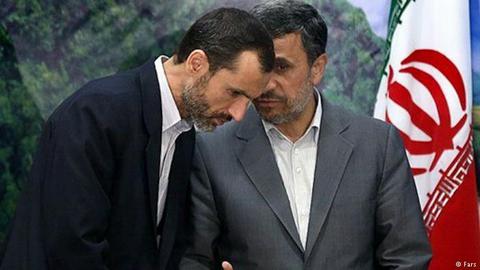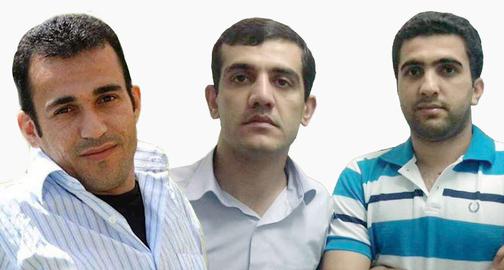Former president Mahmoud Ahmadinejad has publicly appealed to the Supreme Leader to intervene on the case of his close ally and confidant Hamid Baghaei, prompting the judiciary to bring further punishments against Baghaei and other close associates of Ahmadinejad.
On September 11, Ahmadinejad published a letter that he had written to Ayatollah Khamenei on August 28, pleading with him to take action on behalf of Baghaei, who he said had been “unjustly” treated by the Iranian judiciary [Persian link]. But just 24 hours later, the judiciary issued three more verdicts against his close associates.
The court sentenced Baghaei to 15 years in prison for embezzlement on March 13. Following Ahmadinejad’s entreaties, he was sentenced to an extra six months in prison for insulting authorities. It also took action against Ahmadinejad’s former vice president, Esfandiar Rahim Mashaei, sentencing him to six years and six months in prison for “propaganda against the regime,” “conspiracy to commit a crime against national security” and “insulting judiciary officials.” Five years of his sentence is mandatory. The third affected by Ahmadinejad’s actions is Ali Akbar Javanfekr, Ahmadinejad’s press advisor, who was sentenced to five years and one month in prison on the charge of “conspiracy to commit a crime against national security.”
“Following the unjust verdict against Mr. Mashaei,” Ahmadinejad’s Telegram channel reported, “Dr. Ahmadinejad will soon write a letter to the Exalted Leader, explaining the unjust and unlawful actions of the judiciary.” Ahmadinejad is also expected to raise his objection to the verdicts in a speech in Karaj near Tehran on Friday, September 14.
The former president has appealed to Ayatollah Khamenei in writing about the court cases more than once. After he received no response from the Supreme Leader, he took the step of publishing his August 28 letter. In turn, members of the judiciary have expressed their dissatisfaction. “Some people believe if they take sanctuary [in holy shrines], the judiciary will retreat,” said the judiciary chief Sadegh Larijani on September 10 during a meeting with high officials — a reference to Baghaei's attempt to avoid a court appearance by seeking refuge in a Tehran shrine in 2017. “They have tried to make waves to announce their personal hatred toward judiciary officials...They have insulted the judge and the judiciary inside the courtroom and still continue to do this with speeches in one city or another.”
These words clearly show that the Iranian judiciary has Ayatollah Khamenei’s support to prosecute close associates of Ahmadinejad, and that the former president's efforts and letters are not going to change anything — especially since Larijani has expressed the same sentiments as Khamenei. On December 27, 2017, the Supreme Leader advised that Ahmadinejad “must not talk for personal gain,” although he did not directly name him. In fact, both Larijani and Khamenei share the belief that Ahmadinejad’s actions are absolutely geared toward personal gain and not toward justice.
So could the judiciary now take action against Ahmadinejad himself?
“People are Savvy”
Ayatollah Khamenei refrained from answering the former president’s letters, but indirectly he had spoken volumes.
In his December 27 speech, he complained: “There are those who...just yesterday they had all the reins of leadership in their hands but now...they are playing ‘opposition.’ They have no right to talk against this country...Now, some person might imagine that he is influencing people. No, people are informed. They are savvy and do not accept such a thing...any child can throw rocks and break glass, but this is not an accomplishment...one cannot be in charge of everything in the country for 10 years and suddenly turn into opposition the next decade...Imam [Khomeini] said that the touchstone for any individual is the present time.”
When, on August 12, 2016, Ahmadinejad called for the resignation of President Rouhani, Khamenei described his behavior as playing for the enemy. “Some claim that they are supporters of the underdog and want to set things right,” he said. “They themselves are not aware that they are talking and acting within the framework of the enemy’s plot...Those who say that the government must be dismissed are playing a part in the enemy’s scheme.”
The phrase “they themselves are not aware” is significant because it shows that the Supreme Leader believes Ahmadinejad is doing what he does “unconsciously,” and is not driven by bad intentions. That is why, at least up to now, the judiciary has not gone after the former president.
At the same time, Khamenei’s comment that the people “are savvy and do not accept such a thing” shows he does not believe that Ahmadinejad has enough popular support to be a threat. Therefore, he neither wants Ahmadinejad to be personally prosecuted, nor does he see a need for it.
Based on these observations, it would appear that, to a large degree, the case of Ahmadinejad depends on Ahmadinejad himself. In his letters, the former president has attacked the heads of the three branches of the government, and sometimes the commanders of the Revolutionary Guards, but rarely he has publicly and directly criticized Khamenei himself. If he changes his tone in the future, he will be laying the groundwork for the judiciary to take action against him. But if he avoids such a course of action, his opponents will remain satisfied with the arrests of his close associates, and with the knowledge that they have completely isolated and marginalized him.
To understand the situation better, it is useful to make comparison with Mehdi Karroubi, the reformist candidate in the disputed 2009 presidential election. The authorities’ first action against Karroubi was to put him under house arrest. Since then, he has addressed many sharply-worded letters to the Supreme Leader, and these letters have not led to harsher actions being taken against him, such as putting him on trial or in prison. Karroubi’s opponents are satisfied that he is under house arrest and the most he can do is write letters. They do not seek harsher punishments for him and are in fact happy if he continues to write such letters so that he remains under house arrest.
Losing Privileges
So it seems reasonable that if Ahmadinejad continues writing letters in this way — meaning that if he does not directly disrespect Ayatollah Khamenei and instead puts the blame on other institutions — the present state of affairs will continue, and his opponents will also remain satisfied. But if he does change course, he will find himself in new and much more hostile territory. For example, if he starts attacking the Supreme Leader directly, it is very likely that he will not be allowed to continue his many visits around Iran or to deliver public speeches. He might also lose his membership to the Expediency Council. Taken together, this would mean he would lose the most important outlets available to him for promoting himself and his political views. It is unlikely that he would want to lose these privileges.
Ahmadinejad’s current situation is a state of purgatory. He might not like being there, but he knows that doing anything else means going to hell. Given these options, he will choose to remain where he is.
More on Ahmadinejad vs. the Islamic Republic establishment:
Decoding Iranian Politics: The Supreme Leader vs. Mahmoud Ahmadinejad, April 17, 2018
Ahmadinejad’s Confidant Arrested, March 18, 2018
Ahmadinejad to Khamenei: We Need Change Now, February 22, 2018
Will the Larijani Brothers Go for Ahmadinejad’s Jugular?, December 16, 2017
, November 28, 2017
Ahmadinejad Returns With Vengeance, November 17, 2017
Khamenei vs Ahmadinejad: The Battle Continues, April 3, 2017
, September 28, 2016
Judiciary Jails Ahmadinejad Press Allies, June 20, 2016
, June 10, 2015
visit the accountability section
In this section of Iran Wire, you can contact the officials and launch your campaign for various problems


























comments